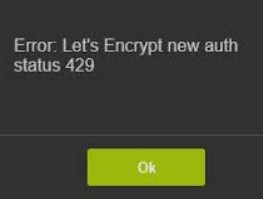Generally, the Let’s encrypt new auth status 429 error occurs when too many certificates are created for a domain on a specific period of time. As a result, it exceeds the Let’s Encrypt’s rate limit on limit Certificates per Registered Domain.
As a part of our Server Management Services, we help our Customers to fix SSL related errors regularly.
Today, let’s discuss the possible causes and fixes for this error.
What causes the Let’s encrypt new auth status 429?
Let’s Encrypt has a limit for the number of certificates requests that we can place per domain name known as ‘Certificates per Registered Domain’. For a single domain, this is set as 50 per week. Since this limit is per each registered domain. ie, a request for www.example.com and test.example.com will be counted against example.com itself. Exceeding the Certificates Per Registered Domain limit commonly triggers Let’s encrypt new auth status 429 error.
In case, if there is a lot of subdomains, we can combine them into a single certificate, up to a limit of 100 Names per Certificate. Considering the above limit, that means we can issue certificates containing up to 5,000 unique subdomains per week. A certificate with multiple names is called a SAN certificate, or sometimes a UCC certificate.
The most common rate limit of 50 certificates per domain per 7 days in a place that is set by Let’s Encrypt. Let’s Encrypt directly defines this limit.
Also, there are two other limits:
- User can create a maximum of 10 Accounts per IP Address per 3 hours.
- User can create a maximum of 500 Accounts per IP Range within an IPv6 /48 per 3 hours.
For instance, the error appears as below.

How we resolve the let’s encrypt new auth status 429 error
Now let’s take a look at the suggestions our Support Engineers provide to get rid of this error.
1. In order to reset the limits, we add a new alias to the domain and re-issue the SSL Let’s Encrypt certificate
2. Wait for the time period to pass and reissue the certificate
[Need any further assistance with Let’s Encrypt errors? We can help you]
Conclusion
In short, this 429 error occurs due to creation of multiple certificates for a domain. Today, we saw the suggestions our Support Engineers provide to overcome this error message.







Thanks for the detailed explanation, helped me alot.